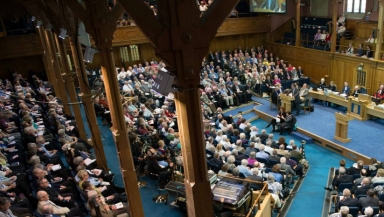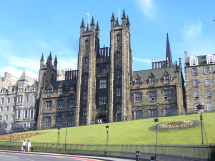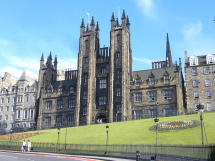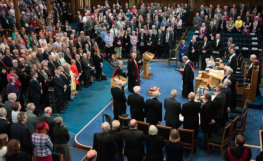
For those outside Presbyterian circles it is difficult to understand the importance of the annual General Assembly of each Church.
This is especially true in Scotland, where for decades the General Assembly of the Church of Scotland was considered the equivalent of a national parliament. Of course, the times they are a-changin'. Scotland now has its own parliament and the Church of Scotland has declined from 1.4 million members to fewer than 400,000.
This decline has been matched by a fall in press interest. Apart from a few cursory mentions based on Church press releases, there is little that appears even in the Scottish media - unless, of course, there is something that is perceived as controversial. Such was the opening of the Church of Scotland Assembly on Saturday, when the Church finally decided to accept the ordination of ministers in same sex civil partnerships.
This is a process that began in 2009 and has resulted in considerable discussion, church politics and maneuvering in the whole denomination. There has been significant 'spin' from the Church of Scotland telling the press that only 21 of 800 ministers have left and only 14 congregations. But that is not quite the whole story.
I was present in 2009 and at the subsequent debates in 2011 and 2013. It was clear from the beginning that there was a concerted attempt, not 'to discern the will of God in the Scriptures' (the initial reports made it clear that the Bible was actually clearly against same-sex partnerships) but rather to ensure that as many evangelical congregations, ministers, elders and members would stay.
The evangelicals were a significant part of the denomination, with large city-centre churches. The denomination, which is struggling financially, could ill afford to lose their resources - not only financially but also in terms of manpower. The Church has a major crisis in terms of recruiting clergy, even with a declining number of congregations.
Overall the strategy to keep the evangelicals on board seems to have worked, although significant congregations such as St Georges Tron in Glasgow, Gilcomston in Aberdeen, Holyrood Abbey and St Catherine's Argyll in Edinburgh and a large part of Logie and St John's in Dundee, have left.
But there is much more than these figures. The Church of Scotland is losing 16,000 members per year, 40 congregations and 25 ministers. For every one member added by profession of faith and two by transfer, 10 are removed by death and 10 'for other reasons'. The decision of the General Assembly to go against what it recognised was the teaching of the Bible means that while congregations may not officially leave (the buildings are centrally owned and the denomination has ensured that those who leave get nothing and take nothing with them), individuals can and do. And these individuals tend to be the most committed: Sunday school teachers, young leaders, elders and so on.
The Church of Scotland has launched a recruitment video that to my mind exemplifies the problem. It is slick, well produced and attractive. It's a great advert for those who want to be community social workers. In terms of the role of the minister as of word and sacrament, that is completely missing.
Those who regard that as being the backbone of the Church are disappointed, disillusioned and deserting the Church. I suspect that the decision last Saturday will only accelerate the exodus. The 'gentle decline' (as one official described it) will continue, people will leave, but others will stay to fight on. The Moderator, himself an evangelical, made a plea for unity, but there are those such as Rev Dr Andrew McGowan who have formed a new grouping called Covenant Fellowship and who intend to fight on.
Dr McGowan wrote of Saturday's decision: "This is utterly disgraceful. The GA has ignored the plain teaching of Scripture and instead followed the world. What is worse, the intention is to amend this on Thursday to include Ministers and Deacons in same-sex marriages. Covenant Fellowship Scotland hereby calls the Church to repentance, urges all Christians to refuse to accept this decision and urges Presbyteries to disobey the GA by holding to orthodox biblical Christianity."
Meanwhile the Assembly continues this week and will largely be ignored by the media, except on Thursday when the issue of Same Sex Marriage raises its head. As of this moment the Church of Scotland upholds the traditional position that those in same sex relationships cannot be ministers, though it will allow individual congregations to go against that. But what about same-sex marriages?
As it currently stands the Church is opposed to same-sex marriages, but will allow ministers in same-sex partnerships. It is a confused mess and the issue will be dealt with on Thursday. The general view is that it will be passed down to yet another theological commission and kicked into the long grass for a couple of years, although most people recognise how inconsistent that is, and how inevitable the decision is. The rubicon has already been crossed.
Meanwhile, literally across the road from the Church of Scotland Assembly hall, at the top of the Royal Mile in Edinburgh, another Presbyterian Assembly will be taking place: that of the Free Church of Scotland.
It is a smaller and quieter affair. A couple of decades ago the Free Church went through its own tumultuous Assemblies where it was constantly the subject of newspaper headlines – for all the wrong reasons. But in the past decade it has reinvented itself and is now a growing and vibrant small denomination. This Assembly will see several new churches welcomed into the denomination. Yours truly has the privilege of being appointed moderator tonight.
I suspect it will be a relatively harmonious and quiet Assembly – all the problems at the moment are the problems of growth. But we will do what we can to enliven it! New church plants, a new fund for mission, the development and growth of Edinburgh Theological Seminary and the merging of international and home missions will probably be the main issues.
I will try and write a personal blog each evening and you can follow the proceedings online at the Free Church website.
Just as the political nation of Scotland has been shaken up, it appears as though the Lord is shaking the whole church here. Just as the political shake-up sends ripples throughout the whole United Kingdom and beyond, so the Church shake-up could have a similar effect. Pray for us, brothers and sisters!

















